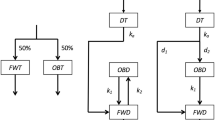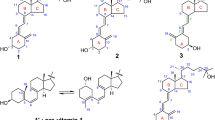Abstract
SOME investigations of mineral metabolism would be made easier if there were a simple method for establishing a constant concentration of a radioactive tracer in the blood plasma for periods of several days or weeks. The need for such a method occurred recently in this department when it was desired to estimate the net transfer of calcium and phosphorus from the cow to the fœtal calf during the last few days of pregnancy, and also the endogenous excretion and gastrointestinal absorption of these elements during and after the same period.
This is a preview of subscription content, access via your institution
Access options
Subscribe to this journal
Receive 51 print issues and online access
$199.00 per year
only $3.90 per issue
Buy this article
- Purchase on Springer Link
- Instant access to full article PDF
Prices may be subject to local taxes which are calculated during checkout
Similar content being viewed by others
References
Carr, T. E. F., and Parsons, B. J., Intern. J. App. Rad. and Isotopes. 13, 57 (1962).
Author information
Authors and Affiliations
Rights and permissions
About this article
Cite this article
SANSOM, B. A Simple Method for Establishing Stable Concentrations of Radioactive Calcium, Strontium and Phosphorus in the Plasma of Goats and Cows. Nature 202, 205–206 (1964). https://doi.org/10.1038/202205a0
Issue Date:
DOI: https://doi.org/10.1038/202205a0
Comments
By submitting a comment you agree to abide by our Terms and Community Guidelines. If you find something abusive or that does not comply with our terms or guidelines please flag it as inappropriate.



